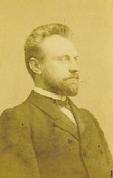"The method of theology is established on three foundations (principia). The ultimate source and foundation of revelation is God (principium essendi). God's self-consciousness is conveyed through his self-communication and presented in the world as the external foundation of knowledge (principium cognoscendi externum). With the possibility of conducting science established, the Logos makes reason and intellect possible as the creator of the reality outside ourselves and the laws of thought within us. Scripture, the instrumental cause of theology, bears witness to the fact that revelation proceeds from God before and after the fall. Scripture is revelation itself. Third, the principium cognoscendi internum presupposes the disclosure of divine self-revelation mediated deeply into the human self-consciousness through the illumination of the Holy Spirit. Creation is the foundation for revelation from which proceeds all religious and ethical life. For Bavinck the question is never 'does God exist' but 'what is our relationship to him.'
Sin has disrupted true religion but has not eradicated the principium essendi. Religion is integral to human nature as created in the image of God. The entire world is a revelation of God; every creature, 'In its own way is the embodiment of a divine thought.' General revelation permeates nature and human history unfolding through historical process. It appeals primarily to the intellect but cannot itself produce saving knowledge or personal faith. E. P. Heideman finds Bavinck's position dangerously close to the Greek concept of the hule yet consistently maintaining that reason is not independent of revelation without going so far to say, as Emil Brunner, that reason is co-worker with revelation. Bavinck warns everywhere that without a strong view of revelation rooted in sola scriptura the alternatives will lean toward autonomy and run a course into deism and pantheism. Assuming as much dissolves religious knowledge into unconscious impressions of the divine or else casts faith into the mold of the enlightenment as a logical assent to the historical fact of scripture. For Bavinck this is disaster: dogmatic truth not aiming at the knowability of God loses its character, its certainty, and the intimate link between externum and internum in the personal activity of the Holy Spirit." (Joel Heflin, Sin, the Menace to Certainty, ETS, Nov. 2009. Italics Original).
Friday, October 15, 2010
The Presuppositionalism of Herman Bavinck
Subscribe to:
Post Comments (Atom)


No comments:
Post a Comment